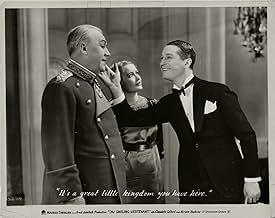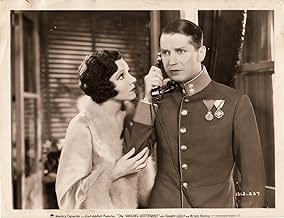IMDb रेटिंग
7.1/10
4.3 हज़ार
आपकी रेटिंग
अपनी भाषा में प्लॉट जोड़ेंAn amorous lieutenant is forced to marry a socially awkward princess, though he tries to keep his violin-playing girlfriend on the side.An amorous lieutenant is forced to marry a socially awkward princess, though he tries to keep his violin-playing girlfriend on the side.An amorous lieutenant is forced to marry a socially awkward princess, though he tries to keep his violin-playing girlfriend on the side.
- 1 ऑस्कर के लिए नामांकित
- 4 जीत और कुल 1 नामांकन
Charles Ruggles
- Max
- (as Charlie Ruggles)
Maude Allen
- Lady in Waiting
- (बिना क्रेडिट के)
Granville Bates
- Bill Collector
- (बिना क्रेडिट के)
Harry C. Bradley
- Count Von Halden
- (बिना क्रेडिट के)
Carrie Daumery
- Lady in Waiting
- (बिना क्रेडिट के)
Ludwig Heinsich
- Man
- (बिना क्रेडिट के)
Cornelius MacSunday
- Emperor Franz Josef
- (बिना क्रेडिट के)
Elizabeth Patterson
- Baroness von Schwedel
- (बिना क्रेडिट के)
Janet Reade
- Lily
- (बिना क्रेडिट के)
Werner Saxtorph
- Joseph
- (बिना क्रेडिट के)
Karl Stall
- Master of Ceremonies
- (बिना क्रेडिट के)
Robert Strange
- Col. Rockoff
- (बिना क्रेडिट के)
Charles Wagenheim
- Arresting Officer
- (बिना क्रेडिट के)
फ़ीचर्ड समीक्षाएं
Lubitsch's third great musical is perhaps his most immoral, along with "One Hour With You". The screenplay by Ernest Vajda and Samson Raphaelson is replete with the occasional Lubitschian double entendres and naughtiness. The film often recalls the lilting grace of Lubitsch's "The Love Parade" but it also looks ahead to the ironic romantic triangle of Lubitsch's lauded masterpiece "Trouble in Paradise".
Here, Chavalier's Lieutenant Niki is torn between an aristocratic princess Anna (Miriam Hopkins) and a working class violinist Franzi (Claudette Colbert), the same way Herbert Marshall's Gaston in "Trouble in Paradise" must choose either Kay Francis's wealthy Madame Colete or his fellow thief, Miriam Hopkin's Lily. But there is a difference. In "Trouble in Paradise", Gaston abandons Mme. Colete for Lily, but in "Smiling Lieutenant", Chevalier unconditionally accepts his forced romance with Anna. At first, Niki is happily fond of Franzi who is introduced to him by his friend Max (Charlie Ruggles, who played one of rejected suitors in "Trouble in Paradise"). But ultimately he is forced to marry princess Anna of the neighboring kingdom of Flausenthurm. The love scenes between lieutenant Niki and Franzi are incredibly charming and flavorsome, while the marriage of Niki and Princess Anna seems unpleasant and uninspired. But the film's charm or brilliance lies in its joyous musical numbers and songs, and its ironic immoral look at its characters. Irony and cynicism are key to understanding Lubitsch's art, especially his works of the early 30s, and "Smiling Lieutenant" is no exception. There is, for instance, an irony and immorality in the lovely number "Jazz Up Your Lingerie", as Princess Anna tries to emulate Franzi in order to look sexy for Niki.
"The Smiling Lieutenant" remains Lubitsch's most underrated musical. Not many people have seen it. It deserves to be seen and compared with Lubitsch's later works, particularly "Trouble in Paradise."
Here, Chavalier's Lieutenant Niki is torn between an aristocratic princess Anna (Miriam Hopkins) and a working class violinist Franzi (Claudette Colbert), the same way Herbert Marshall's Gaston in "Trouble in Paradise" must choose either Kay Francis's wealthy Madame Colete or his fellow thief, Miriam Hopkin's Lily. But there is a difference. In "Trouble in Paradise", Gaston abandons Mme. Colete for Lily, but in "Smiling Lieutenant", Chevalier unconditionally accepts his forced romance with Anna. At first, Niki is happily fond of Franzi who is introduced to him by his friend Max (Charlie Ruggles, who played one of rejected suitors in "Trouble in Paradise"). But ultimately he is forced to marry princess Anna of the neighboring kingdom of Flausenthurm. The love scenes between lieutenant Niki and Franzi are incredibly charming and flavorsome, while the marriage of Niki and Princess Anna seems unpleasant and uninspired. But the film's charm or brilliance lies in its joyous musical numbers and songs, and its ironic immoral look at its characters. Irony and cynicism are key to understanding Lubitsch's art, especially his works of the early 30s, and "Smiling Lieutenant" is no exception. There is, for instance, an irony and immorality in the lovely number "Jazz Up Your Lingerie", as Princess Anna tries to emulate Franzi in order to look sexy for Niki.
"The Smiling Lieutenant" remains Lubitsch's most underrated musical. Not many people have seen it. It deserves to be seen and compared with Lubitsch's later works, particularly "Trouble in Paradise."
There is more real sexuality between male and female in five minutes of a Lubitsch musical than in two and a half hours of any average film you're likely to see today. Needless to say, there is no nudity. It's all done with innuendo and the extraordinary degree of energy and physical magnetism that Lubitsch manages to elicit from all his actors. For once in a film, you actually feel that these extremely attractive young people can hardly wait to go to bed with each other, and when they do (off-screen of course) the result is
transformative. When they burst out in song, as they do on the slightest provocation in a Lubitsch musical, it is because they are full of emotions they can no longer contain. There's nothing dirty or smutty whatsoever in the Lubitsch Touch, as there is sometimes in the work of his disciple Billy Wilder. Lubitsch's characters explode with life, the joy of being young and in love. There are many great film directors, but not one has ever been able to create the kind of sexual energy that Lubitsch puts into all his films. Silly as the plots may be, mediocre as most of the songs are, his films bristle with the romance and humor of life.
Once more, thanks to TCM, we get the chance of watching this wonderful, charming, early talkie by the master of sophisticated comedy and innuendo, Ernst Lubitsch.
This is an absolutely entertaining and absorbing tale of a carefree, debonair Viennese Lieutenant, who falls for a violin player, thus finding his perfect sexual counterpart, but because of circumstances, becoming married to a prudish, mousey, princess.
Chevalier is the perfect "Smiling Lieutenant" of the title, singing in great from with his heavy trademark, french-accent. Colbert, in an early stage of her career, looks very different from her definitive trademark "Look", she acquired afterwards.....but is equally carefree, joyous and flirtatious. Miriam Hopkins is excellent as the princess, who falls madly in love with Chevalier, and who will do anything to have him!!
Just as it happened with "Trouble in Paradise", I really hope that this gem, as well as "Design for Living", "Monte Carlo", "The Love Parade", "Love Me Tonight", "One Hour With You", will become available on DVD, in decent form, as they deserve, as primary examples, of the long gone Pre-Code Era!!!
This is an absolutely entertaining and absorbing tale of a carefree, debonair Viennese Lieutenant, who falls for a violin player, thus finding his perfect sexual counterpart, but because of circumstances, becoming married to a prudish, mousey, princess.
Chevalier is the perfect "Smiling Lieutenant" of the title, singing in great from with his heavy trademark, french-accent. Colbert, in an early stage of her career, looks very different from her definitive trademark "Look", she acquired afterwards.....but is equally carefree, joyous and flirtatious. Miriam Hopkins is excellent as the princess, who falls madly in love with Chevalier, and who will do anything to have him!!
Just as it happened with "Trouble in Paradise", I really hope that this gem, as well as "Design for Living", "Monte Carlo", "The Love Parade", "Love Me Tonight", "One Hour With You", will become available on DVD, in decent form, as they deserve, as primary examples, of the long gone Pre-Code Era!!!
There is little to add to the praise this classic film has already received from professional and amateur critics and viewers. It is an object lesson in the art of filmmaking, cleverly conceived and plotted, gorgeously photographed, well acted by a colorful cast, constantly fresh and joyous, inventive and artful. The dialogue is brilliant, especially when it blossoms with playful double entendres. The mise-en-scene is filled with the engaging formalities so beloved by its director Ernst Lubitsch, and visual cues giving wordless information about plot and character. The contrast between the females, Miriam Hopkins and Claudette Colbert, is deftly arranged. Though Chevalier has charm to burn, his thick French accent does occasionally blunt the effect of the dialogue. But his light comedy skills are otherwise formidable and in conjunction with Lubitsch's staging and framing add up to cinematic magic. Colbert equals and even surpasses him with her own skill and charm. She gives particular oomph to her songs, acting them fully. Hopkins can be a grating performer but here tones it down. Her piano playing is impressive, whether it's real or not.
If you like cotton candy, or maybe a marshmallow sundae with sprinkles and a cherry on top, this picture will be among your favorites. What could be more appealing than a Lubitsch romantic comedy with its characteristic sly innuendos? Perhaps one that is set in a palace, with uniformed guards, ladies-in-waiting, and pageantry that no one takes seriously. More appealing than that? All of the above, with music. Want more? The casting is perfect: a flirtatious, mugging Chevalier; a young and nicely naughty Claudette Colbert; and most notably Miriam Hopkins effectively playing the extremes - a prim, virginal innocent who learns the ways of a vamp in order to hold her man. As her father, George Barbier contributes impressively, too. Great fun; one of Lubitsch's best.
क्या आपको पता है
- ट्रिवियाA French version with dialogue and lyrics by Henri Bataille was shown in New York on 15 October 1931 and was also a big hit in Paris. It had the same three leading actors and was filmed at the same time as the English language version, as dubbing had not yet been invented.
- गूफ़The unpaid bill demands only 1614,25 crowns, even though the sum adds up to 1855,25 crowns.
- इसके अलावा अन्य वर्जनA version in French with dialogue and lyrics by 'Henri Bataille (II)' played in New York City, New York, USA on 15 October 1931, and was a big hit in Paris. It probably was a dubbed English version, but slightly shorter at 2,476.80 m in length.
- कनेक्शनFeatured in The House That Shadows Built (1931)
- साउंडट्रैकToujours l'Amour in the Army
(1931) (uncredited)
Music by Oscar Straus
Lyrics by Clifford Grey
Sung by Maurice Chevalier twice
टॉप पसंद
रेटिंग देने के लिए साइन-इन करें और वैयक्तिकृत सुझावों के लिए वॉचलिस्ट करें
- How long is The Smiling Lieutenant?Alexa द्वारा संचालित
विवरण
- रिलीज़ की तारीख़
- कंट्री ऑफ़ ओरिजिन
- भाषाएं
- इस रूप में भी जाना जाता है
- Nasmejani poručnik
- फ़िल्माने की जगहें
- उत्पादन कंपनी
- IMDbPro पर और कंपनी क्रेडिट देखें
- चलने की अवधि1 घंटा 33 मिनट
- रंग
- पक्ष अनुपात
- 1.20 : 1
इस पेज में योगदान दें
किसी बदलाव का सुझाव दें या अनुपलब्ध कॉन्टेंट जोड़ें


































